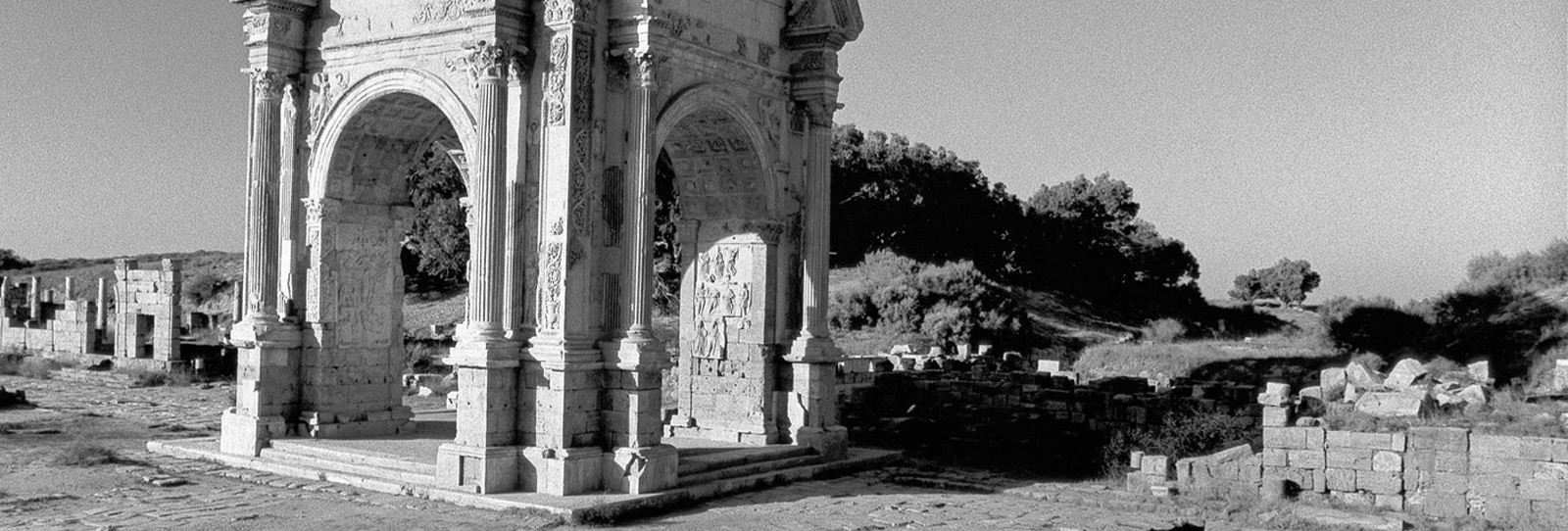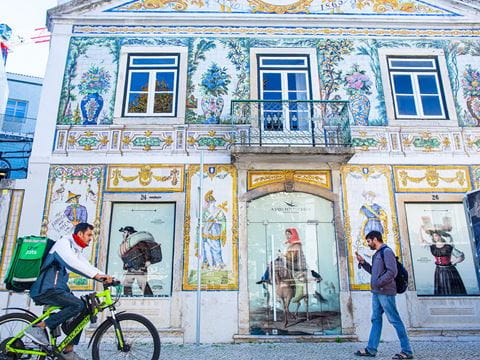
The Life of Roman Emperor Septimius Severus: Analyzing What Makes an Effective Leader
History
Europe
North Africa
Learn about how this second-century CE Roman politician rose from humble beginnings and became an effective leader.
The following activities and abridged text build off "The Emperor From Africa," written by Barnaby Rogerson and photographed by Don McCullin.
WARM UP
Scan the article’s photos and captions to predict the its theme and main idea.
IF YOU ONLY HAVE 15 MINUTES ...
Formulate a map/timeline of Septimius Severus’ rise to become emperor of Rome.
IF YOU ONLY HAVE 30 MINUTES ...
Discuss the concept of leadership, examine Septimius Severus’s leadership style, and analyze how effective it was.
VISUAL ANALYSIS
Draw information by examining two photographs in the article. Then read the captions for the photographs, and compare how you gained information from both sources.
Directions: As you read, you will notice certain words are highlighted. See if you can figure out what these words mean based on the context. Then click the word to see if you’re right.
The Emperor from Africa
Septimius Severus was the first African to rule the Roman Empire. From 193 to 211 CE, he led as the 18th emperor in a line dating back to Julius Caesar in the first century BCE.
Early Beginnings and Family Ties
Severus was born in Leptis Magna, a medium-sized, wealthy port city in Libya, in 145. He grew up speaking Punic, the language of much of North Africa, and he was schooled in Latin, the language of the empire.

At first glance Severus’ ascent from a province in Africa to head of the world’s superpower appears improbable. When he was born, the Roman world consisted of 2,500 self-governing cities. Of these, only one-fifth were in North Africa.

Each city was dominated by a tiny minority of privileged landowners. They collected taxes and remitted them to Rome, served as priests in the local temples and as magistrates who ran the cities and sat on the town councils.

In their hometowns, members of this class were a privileged elite. But from the perspective of the imperial court in Rome, they were very nearly chaff. Of the 65,000 provincial landowners, only the top one percent could aspire to join the real ruling class of the empire—the 2,000-man Senate in Rome.
Question: Why was it improbable that Septimius would become emperor?
Septimius came from North Africa, which was far from Rome. Although his family was powerful there, his family was marginal compared to Rome’s ruling class.
Septimius came from North Africa, which was far from Rome. Although his family was powerful there, his family was marginal compared to Rome’s ruling class.
Septimius Severus became one of them, but it was no easy feat. It took his family four generations for him to become emperor.

The first step for his wealthy North African family had been to acquire land in Italy. Bankers or merchants could become senators if they invested their fortunes in land.
The next step was to convert old North African names and provincial accents to Roman equivalents. Speaking and writing Latin was essential for anyone aspiring to a career in law, and it was the first step on the ladder to imperial administration.
Severus’ grandfather and namesake, Lucius Septimius Severus, had been content with a modest public role as a barrister giving legal cases a first hearing. But he also made social connections that helped the next generation of his family.
Two brothers from that generation, Publius Septimius Aper and Gaius Septimius Severus both served as consul to the top tier of administrative magistrates, starting in 153 CE and 160 CE respectively. Both were cousins to Severus’ father, who remained in Leptis Magna. Thus, when 18-year-old Septimius Severus sailed to Rome, he was part of a well-established clan.
Military Career
Severus followed in the path of his elder brother, Geta, who had made a good start to a public career. Though Severus’ first appointment was to an unpromising post in Sardinia, an island west of present-day Italy, he and Geta rose to leading military roles.
There were in all the Roman Empire only 25 legions. Severus’ brother commanded two of them on the lower Danube, while Severus led three on the upper Danube, beginning in 191 CE. This put their family in an exceptional position of power, one critical to defending the empire from Germanic tribes. It reveals the degree of trust vested in them by Pertinax, who was then in Rome running the empire on behalf of the increasingly insane Emperor Commodus.
Question: What steps did Septimius’s family take to gain the status and led to his becoming emperor?
His family acquired land in Italy. They learned Latin and chose Latin names. They secured administrative positions in the empire. They showed loyalty so that they were trusted.
Severus Consolidates His Power and Becomes Emperor
Two years later, fortune threw down a challenge: Commodus was killed, and was succeeded by Pertinax, who was killed three months later by the elite military unit responsible for the safety of Rome. They then auctioned off the imperial throne. Severus with his legions made a bid, as did others. The year 193 CE became known as “The Year of the Five Emperors.”

Severus triumphed in the internal wars that followed. He seized the capital and strengthened his hold by standing as the avenger and heir of Pertinax. To crush the military elite, “he relieved them of their arms, took away their horses, and banished them from Rome,” wrote one historian. Severus then doubled the pay of his legionnaires, a move that helped ensure their loyalty but also made him, and future emperors, increasingly dependent on the military.
Severus’ provincial origins shaped the way he ruled. He focused on efficient government rather than greed and opulence. For 15 of his 18 years as emperor, Severus ruled from provincial cities and military camps, rather than from Rome, leading prolonged campaigns through the provinces and frontier regions.
He expanded Rome’s reach into present-day Iraq. He strengthened security of trade routes on the Arabian Peninsula. He traveled up the Nile, visiting ancient religious sites and relaxing restrictions on local religious expression. Then he campaigned in the Sahara, extending the frontier some 150 kilometers from the coast.
Through these tasks, Severus revealed a conception of the empire as a commonwealth, with a reduced role for Rome’s ruling class, perhaps due in part to his own provincial origins and wide travels. Likewise, his perspective led him to advocate religious tolerance and even what we would call today cross-cultural inclusion. Nor was he a one-off: His son Emperor Marcus Aurelius Antoninus (nicknamed Caracalla) completed many of his father’s projects and extended Roman citizenship across the empire.

What is especially fascinating about Severus is that in addition to reinforcing and extending the empire’s borders, he sustained and bridged parallel cultural identities, maintaining his North African ties while laying the foundations for an imperial dynasty that lasted beyond his death until 235 CE.
He stayed true to his hometown heritage by the choice of his first wife, Paccia Marciana, around 175 CE. After her death he married Julia Domna, daughter of the high priest of Emessa in 186 CE or 187 CE. She hailed from an Arab dynasty that had ruled the Syrian desert as allies of one of the kingdoms established by heirs of Alexander the Great.

Question: Identify actions by Septimius that are examples of leadership. These would be actions that helped him solidify his power, helped people who directly served him as well as actions that benefited the people under his rule.
He seized the capitol and took away the arms, horses and banished the military elite from Rome.
He doubled his legionnaires pay.
He relaxed restrictions on religious expression, reduced the role for Rome’s ruling class and advocated for religious tolerance.
But Severus was no saint. He came to power by winning civil wars in Syria and Gaul. He had potential rivals killed. He purged the senate, and he allowed his army to sack conquered cities.
His final, ultimately futile, campaign took place in the far reaches of the Empire, in the British Isles. Why?
Very few Roman emperors had ever wished to visit Britannia, let alone conquer the far-away island. He may have envisioned conquest as a prerequisite to deploying his military more effectively. He likely also wanted to bond his sons, Caracalla and Geta, with the army in preparation to assuming rule themselves.

Severus, although sick, led his men to victory, at first. But the next year, 209 CE, the Caledonian fighters won out. The emperor’s last words were advice to his sons: “Give money to the soldiers and despise everyone else.” While they seem bleak, we know that he did not always follow his own recommendations. He left a legacy of reformed laws, reinforced frontiers, restored temples and cities adorned with fountains, shrines, storehouses, processional avenues and marketplaces.
Other lessons

Tracing the History and Geography of Portuguese Tilemaking
Geography
Architecture
Europe
Analyze how culture and technology have changed the ways tiles have been made in Portugal for over 500 years.
Aramco World Learning Center: No Passport Required
For the Teacher's Desk
Project-based learning lies at the heart of AramcoWorld’s Learning Center. Link its resources into classroom curriculum, no matter the subject.
How Art Connects
For the Teacher's Desk
Art links everything—cultures, history, even math. Want to hook students? Try teaching through the art that surrounds us with these stories.